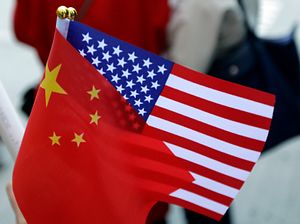Our previous article suggested that China may be committed to building a world order governed by the ancient Chinese concept of li (礼). Such an order regards propriety as the key means to conducting relationships; is based on a concentric zone structure; and is open. While this order is compatible with the current international system, the majority of the members will be China’s neighboring countries, as well as a small number of countries from other continents.
By the time this order is fully established, will China have replaced the global leadership role currently held by the United States? This depends on two factors. First, does China have such a desire? Second, does China have such a capacity?
Chinese leaders including Deng Xiaoping, Jiang Zemin, Hu Jintao, and Xi Jinping have all clearly stated that “China will never seek hegemony.” Xi also further mentioned that China “is not willing to become the so-called ‘world police’, nor to replace anyone.” This can be taken to mean that China does not have the desire to replace the United States’ global role. Some may argue, however, that a country’s desires are volatile, and that capacity matters more – meaning that China will change its desires when its capacity rises. Is China’s capacity likely to exceed that of the United States, then?
One country’s capacity could be divided into “hard power” and “soft power.” Hard power, particularly economic capacity and military strength, is the foundation of the United States’ global leading role after World War II. But a combination of hard and soft power is the necessary and sufficient condition for a global leader’s rise. The soft power of the United States is mainly embodied in the construction and leadership of the postwar international system, its cultural attributes, the development of science and technology and higher education, and the relatively loose immigration policy.
At the end of WWII, the United States accounted for 60 percent of the global GDP and its industrial production capacity was half of that of the world. Its oil and steel production accounted for 70 percent and 64 percent of the world total, respectively, and the United States held 73.4 percent of the gold reserves of the entire capitalist world at the time. With this hard power as the base, in addition to the United States’ advanced production capacity and technological development, U.S. military strength at the end of the WWII surpassed that of the other victorious Allied powers. Thanks to these advantages, the United States has continuously been the world’s largest economy since WWII, and built a global alliance system and a network of global military bases at the same time.
Unlike Great Britain, France, and other countries that exerted international influence through colonies, the United States preferred to govern the world by establishing a series of international systems: the United Nations and its affiliates for the political and security arena; the alliance system and military base network in the military arena; the Bretton Woods system for finance, and the General Agreement on Tariffs and Trade (GATT, which later evolved into the WTO) for trade.
The United States already ranked first in the world in terms of industrial output in 1894. However, it was not until after World War II that it surpassed European countries in terms of technology and higher education. Given the rapid development of the United States in the humanities and social sciences, as well as the influx of European intellectuals during WWII, the United States, by this stage, had replaced the European countries as the global center for scientific research and higher education, thereby attracted talents from all over the world.
The United States’ relatively loose immigration policy also promoted this trend. As a result of gathering global talents, the United States gained an unrivalled capacity for innovation and became a universal home for capable peoples from different countries and civilizations. After WWII, the United States consequently contributed more than 50 percent of the Nobel Prize winners. This talent influx also boosted the U.S. global leadership role. The United States will keep its advantage in attracting high quality immigrants in the foreseeable future.
WWII provided the United States an exceptional opportunity to become a world leader. Reconstructing the world order through war is hard to imagine in the era of nuclear weapons. Given that a peaceful rise is the only realistic choice for China at present, China can only surpass the United States in some specific aspects such as GDP, national defense expenditures, the number of international students, and so on. In terms of the number of allies, global military bases, influence on the United Nations and its affiliates, influence on the global finance sector and so forth, it is very difficult for China to rival the United States.
In addition, cross-civilization governance costs dearly. While U.S. soft power was helped by a global familiarity with European cultural elements, as spread during colonialism, Chinese culture is a typical regional civilization – this significantly raises the cost of China’s global governance and limits China’s global appeal. Further, considering that it is difficult for China to attract global talents like the United States and become a new home for immigrants, China is highly unlikely to outperform the United States in higher education, scientific research, and innovation.
In the process of its rise, China is likely to concentrate on building its own order or system. However, this will be largely limited to regional influence, and mainly reflected in nonmilitary aspects. China can be expected to establish international mechanisms confined to certain areas (such as the Asian Infrastructure Investment Bank), but again, creating dominant international organizations like the United Nations will be impossible for China.
All in all, China is unlikely to replace the United States’ global role after its rise.
Xue Li is Director of Department of International Strategy at the Institute of World Economics and Politics (IWEP), Chinese Academy of Social Sciences (CASS).
Cheng Zhangxi is a post-doctoral researcher at IWEP, CASS.
































